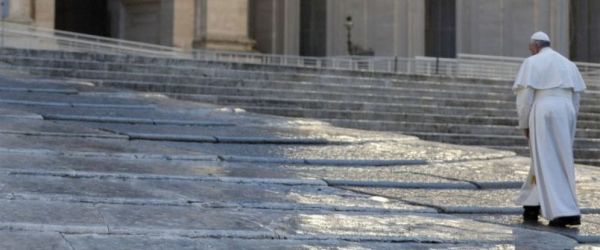The Gospel for today’s liturgy (Jn 6:60-69) shows us the reaction of the crowd and the disciples to Jesus’ discourse following the multiplication of the loaves. Jesus invited them to interpret that sign and believe in him, who is the true bread come down from heaven, the bread of life; and he revealed that the bread he will give is his body and blood. These words sound harsh and incomprehensible to the ears of the people, so much so that, from that moment, the Gospel says, many of his disciples turn back; that is, they stop following the Master (vv. 60, 66). Then Jesus asks the Twelve: “Do you also wish to go away?” (v. 67), and Peter, on behalf of the whole group, confirms their decision to stay with Him: “Lord, to whom shall we go? You have the words of eternal life; and we have believed, and have come to know, that you are the Holy One of God” (Jn 6:68-69). And it is a beautiful confession of faith.
Let us look briefly at the attitude of those who withdrew and decided not to follow Jesus any more. Where does this disbelief come from? What is the reason for this rejection?
Jesus’ words enkindled great scandal: he was saying that God decided to manifest himself and accomplish salvation in the weakness of human flesh. It is the mystery of the incarnation. The incarnation of God is what provoked scandal and presented an obstacle for those people — but often for us too. Indeed, Jesus affirms that the true bread of salvation, which transmits eternal life, is his very flesh; that to enter into communion with God, before observing the laws or satisfying religious precepts, it is necessary to live out a real and concrete relationship with him. Because salvation came from him, in his incarnation. This means that one must not pursue God in dreams and in images of grandeur and power, but he must be recognized in the humanity of Jesus and, as a consequence, in that of the brothers and sisters we meet on the path of life. God made himself flesh. And when we say this, in the Creed, on Christmas Day, on the day of the Annunciation, we kneel to worship this mystery of the incarnation. God made himself flesh and blood; he lowered himself to the point of becoming a man like us. He humbled himself to the extent of burdening himself with our sufferings and sin, and therefore he asks us to seek him not outside of life and history, but in relationship with Christ and with our brothers and sisters. Seeking him in life, in history, in our daily life. And this, brothers and sisters, is the road to the encounter with God: the relationship with Christ and our brothers and sisters.
Even today, God’s revelation in Jesus’ humanity can cause scandal and is not easy to accept. This is what Saint Paul calls the “folly” of the Gospel in the face of those who seek miracles or worldly wisdom (cf. 1 Cor 1:18-25). And this “scandalousness” is well represented by the sacrament of the Eucharist: what sense can there be, in the eyes of the world, in kneeling before a piece of bread? Why on earth should someone be nourished assiduously with this bread? The world is scandalized.
Faced with this prodigious deed of Jesus, who with five loaves and two fish fed thousands of people, everyone acclaimed him and wanted to lift him up in triumph, to make him king. But when he himself explains that the gesture is a sign of his sacrifice, that is, of the gift of his life, his flesh and blood, and that those who want to follow him must resemble him, His humanity given for God and for others, then no, this is not pleasing, this Jesus throws us into crisis. Rather, we should be worried if he does not throw us into crisis, because we might have watered down his message! And we ask for the grace to let ourselves be provoked and converted by his “words of eternal life”. And may Mary Most Holy, who bore her Son Jesus in the flesh and joined herself to his sacrifice, help us to always bear witness to our faith in our real lives.
[Pope Francis, Angelus 22 August 2021]












